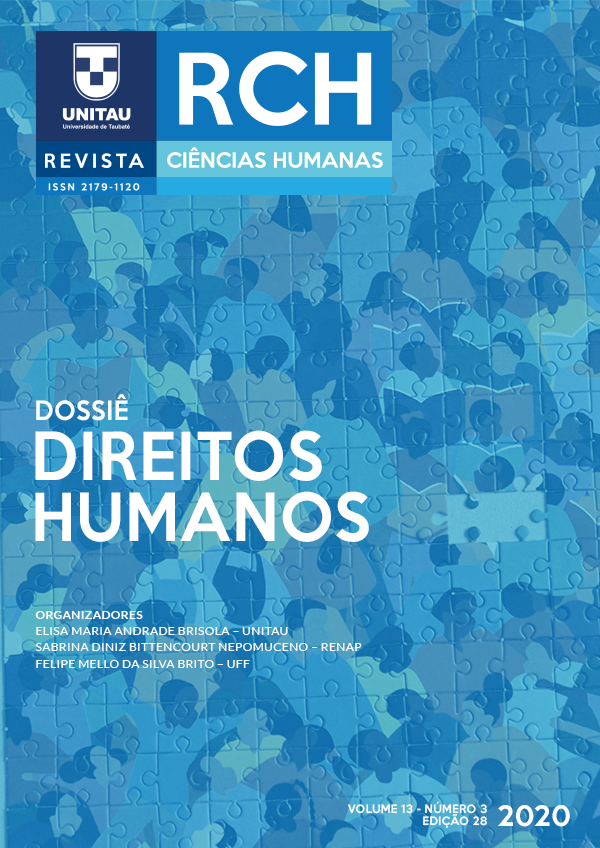LEGALIZAÇÃO DE DROGAS
uma opção socialmente responsável para os direitos
DOI:
https://doi.org/10.32813/2179-1120.2020.v13.n3.a631Palavras-chave:
Proibicionismo, Culturalismo Racial, Seletividade Penal, Legalização das DrogasResumo
Esse artigo propõe um debate sobre os direitos humanos ao compreender o processo de legalização e regulamentação das drogas como uma atitude socialmente responsável dentro de uma necessidade histórico-estrutural de remodelar os processos de entendimento sobre as relações com as drogas, vinculadas diretamente à pobreza, à negritude e à violência. Objetiva ampliar o crescente debate sobre questões antiproibicionistas e compreender o processo de descriminalização dos sujeitos via política antiproibicionista. Trata-se de um excerto de estudo descritivo e qualitativo, com abordagem analítica, à luz da Análise Crítica do Discurso (ACD) direcionada ao proibicionismo de drogas na América Latina. Urge, nessa perspectiva, além de legalizar e regulamentar as drogas consideradas ilegais, que se constitua uma campanha massiva de educação de direitos humanos em diversas esferas sobre as drogas, bem como mudanças na formação educacional dos agentes policiais, estimulando abordagens equalitárias de pessoas, independente do status social, etnia ou condição de moradia. Observou-se que a política antidrogas não tem a droga como seu principal interesse de combate, e sim as populações pobres e não-brancas. Deste modo, a luta contra o preconceito social e racial são essenciais no processo de reconstrução e recodificação da nossa história, nossas culturas e nossas cosmovisões.
Métricas
Referências
BARNÉS, Héctor García. España es un país a la vanguardia de la política de drogas: por qué no se habla de ello. El confidencial, España, on-line, 12 mai 2018. Disponível em:
https://www.elconfidencial.com/alma-corazon-vida/2018-07-12/espana-politica-drogas-por-que-no-se-habla_1587357/. Acesso em: 26 mai 2020.
BENTES, Isabela. Ponham as cartas na mesa e discutam essas leis: a luta pela legalização da maconha no Brasil. Argumentum, Vitória/ES, v. 7, n.1, p. 93-107, jan./jun. 2015. Disponível em: http://periodicos.ufes.br/argumentum/article/view/9050. Acesso em: 26 mai.2020.
CANADA. House Commons. Bill – C45. 21 de junho de 2018. Disponível em:
https://www.parl.ca/DocumentViewer/en/42-1/bill/C-45/royal-assent
Acesso em: 26 mai.2020.
CORDERO, Olga Sánchez. Esta es la propuesta para legalizar la marihuana en México. Publicado pelo canal HuffPost México.2018. Disponível em:
https://www.youtube.com/watch?v=clNZw5klVak
DEL OLMO, Rosa. A face oculta da droga. Tradução de Teresa Ottoni. Rio de Janeiro: REVAN, 1990.
GARAT, Guillermo. Un siglo de políticas de drogas en Uruguay. Montevideo, Uruguay: Fundación Friedrich Ebert (FES), 2013.
FANON, Frantz. Pele Negra, máscaras brancas. Tradução de Renato da Silveira . Salvador: EDUFBA, 2008.
GARZÓN, Juan Carlos; POL, Luciana. O Elefante na sala: drogas e direitos humanos na América Latina: diante de violações sistemáticas dos direitos humanos é necessária a revisão da atual política de drogas na América Latina e no mundo. Sur Revista Internacional de Direitos Humanos, v.12, n.21, p. 1-8, 2015. Disponível em:
https://bdjur.stj.jus.br/jspui/handle/2011/95778. Acesso em: 26 mai.2020.
HART, Carl. Slogans vazios, problemas reais. Sur Revista Internacional de Direitos Humanos, v.12, n.21, p.1-9. 2015. Disponível em:
http://sur.conectas.org/wp-content/uploads/2015/08/Sur-21_Carl-L.-Hart_pt.pdf
Acesso em: 26 mai.2020.
HYPOLITO, Laura Girardi. A realidade social do tráfico de drogas e suas implicações: uma análise das decisões proferidas pelo tribunal de justiça do Rio Grande do Sul, referentes à comarca de Porto Alegre. Disponível em:
http://www.pucrs.br/direito/wp-content/uploads/sites/11/2018/09/laura_hypolito.pdf
Acesso em: 26 mai.2020.
KARAM, Maria Lúcia. A esquerda punitiva. Discursos Sediciosos: Crime, Direito e Sociedade. Rio de Janeiro, Ano 1, v. 1, p. 79-92,1996.
KHAN, Riza; KHAZAAL, Yasser; THORENS, Gabriel; ZULLINO, Daniele. Understanding Swiss Drug Policy Change and the Introduction of Heroin Maintenance Treatment. Eur Addict Res, Basel, v20, p.200–207, 2014.
Disponível em: https://www.karger.com/Article/Pdf/357234. Acesso em: 26 mai.2020.
LEAL, Fabíola Xavier. Movimento Antiproibicionista no Brasil: discursos de resistência. 2017. 374 f. Tese (Doutorado) – Programa de Pós-Graduação em Política Social, Universidade Federal do Espirito Santo, Vitória. 2017.
MARTINS, Vera Lúcia. A política de descriminalização de drogas em Portugal. Serv. Soc. Soc., São Paulo, n. 114, p. 332-346. 2013.
Disponível em: https://www.scielo.br/pdf/sssoc/n114/n114a07.pdf
Acesso em: 26 mai.2020.
SANTOS, Mariana Glenda; SILVEIRA, Thais Elizabeth Santos. O uso crescente das drogas e o processo de criminalização da pobreza. In: SIMPÓSIO MINEIRO DE ASSISTENTES SOCIAIS, 3., Belo Horizonte, 2013. Anais [...]. Belo Horizonte: CREES-6ª região, 2013. p.1-16.
WODAK, Ruth. Do que trata a ACD: um resumo de sua história, conceitos importantes e seus desenvolvimentos. Revista Linguagem em Discurso, Tubarão/SC, v.4, n.esp., p. 223-243. 2004. Disponível em: http://www.portaldeperiodicos.unisul.br/index.php/Linguagem_Discurso/article/view/297/313
Acesso em: 26 mai.2020.
Downloads
Publicado
Como Citar
Edição
Seção
Licença
Copyright (c) 2020 Revista Ciências Humanas

Este trabalho está licenciado sob uma licença Creative Commons Attribution 4.0 International License.
As publicações da Revista Ciências Humanas estão registradas sob a licença Creative Commons Attribution CC-BY.
1. Os conteúdos dos trabalhos são de exclusiva responsabilidade de seu autor.
2. É permitida a reprodução total ou parcial dos trabalhos publicados na Revista, desde que citada a fonte.
3. Ao submeterem seus trabalhos à Revista os autores certificam que os mesmos são de autoria própria e inéditos (não publicados em qualquer meio digital ou impresso).
4. Os direitos autorais dos artigos publicados na Revista são do autor, com direitos de primeira publicação reservados para este periódico.
5. Para fins de divulgação, a Revista poderá replicar os trabalhos publicados nesta revista em outros meios de comunicação como, por exemplo, redes sociais (Facebook, Academia.Edu, etc).
6. A Revista é de acesso público, portanto, os autores que submetem trabalhos concordam que os mesmos são de uso gratuito.
7. Constatando qualquer ilegalidade, fraude, ou outra atitude que coloque em dúvida a lisura da publicação, em especial a prática de plágio, o trabalho estará automaticamente rejeitado.
8. Caso o trabalho já tenha sido publicado, será imediatamente retirado da base da revista, sendo proibida sua posterior citação vinculada a ela e, no número seguinte em que ocorreu a publicação, será comunicado o cancelamento da referida publicação. Em caso de deflagração do procedimento para a retratação do trabalho, os autores serão previamente informados, sendo-lhe garantido o direito à ampla defesa.
9. Os dados pessoais fornecidos pelos autores serão utilizados exclusivamente para os serviços prestados por essa publicação, não sendo disponibilizados para outras finalidades ou a terceiros.





